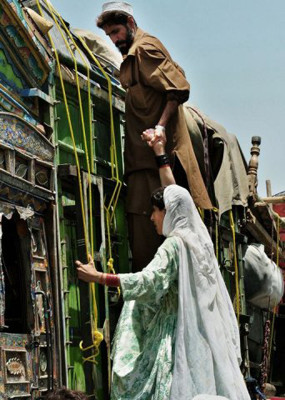By Emal Haidary
KABUL — At a bustling Kabul market, people smugglers are making a quick buck out of Afghans increasingly desperate to buy a new life in Europe before NATO combat forces leave in 2014.
Ordinary people pay up to $13,000 for the chance to embark on a long and perilous journey -- hiding in truck chassis, stowing away on boats or trekking across mountains -- that they hope will take them to a better life.
At Shahzada money exchange market between Kabul's oldest mosque and its foul-smelling river, middlemen ply their trade among the din of currency exchangers shouting out their latest rates and brandishing wads of notes.
Shamim Assir, 20, a thin man with a pale face and trimmed black beard from Logar, south of Kabul, is here to chase up a Turkish visa, which he paid for three months ago but has still not materialised.
"I want to leave my home for a better life, the life is horrible in Logar," he says.
"The security situation is worsening day after day, there is no work for us, we cannot even roam around freely, there is no future," he adds, lines wrinkling his young face.
"In Logar, if you work for the government, the Taliban will arrest you or even kill you. You either work for them or get beaten or killed."

There are more than three million Afghan refugees in 75 countries, according to UNHCR. (Photo: (AFP / File, A. Majeed)
He says that one of his friends was beaten to death by the Taliban for working for the government.
Shamim is among thousands of Afghans who want to leave the country before foreign soldiers do, even though many people are baying for the departure of American forces, blaming much of the violence on their presence.
There are currently around 140,000 international troops in Afghanistan and all NATO-led combat forces are due to leave by the end of 2014.
Suicide bombings, improvised explosive devices and other attacks already kill hundreds of civilians every year, but many Afghans worry that security will worsen after 2014, or even that civil war could reignite.
There has been a surge of Afghans leaving the country in the last five years, Afghanistan's refugee ministry says.
The UN refugee agency UNHCR says that in 2010, more of the world's refugees came from Afghanistan than any other country.
It adds there are more than three million Afghan refugees in 75 countries. Three in 10 of all the world's refugees come from Afghanistan, which was wracked by war even before a US-led invasion ousted the Taliban in 2001.
Most of those who leave go to Pakistan or Iran, but some borrow cash or hand over their life savings in the hope of a better life further afield.
"If you want to go to Turkey, you have to pay $4,000 to get your visa but it will cost you $13,000 if you want to reach Europe via Ukraine and Russia," says one trader at the market, speaking on condition of anonymity.
"This year, the number of asylum seekers has been on the rise. Most of those who come here are very young, in their 20s," he says, claiming to have a waiting list of 2,000 Afghans willing to take on dangerous journeys to escape.
"If you pay less, you have to take a bus from Kabul to Iran via Nimruz province in western Afghanistan and then be smuggled to Turkey, Greece, France or Germany," he tells AFP.
He adds that there are several dozen middlemen like him working at the Shahzada market alone.
The journey to mainland Europe can take months or even years -- many never reach their destination, getting arrested and deported along the way or succumbing to other perils.
Some walk for weeks across the treacherous mountains of Iran, west of Afghanistan, towards Turkey, before crossing by land through eastern Europe, or by sea to Greece and Italy.
In January, a ship reportedly carrying around 260 mostly Afghan asylum seekers to Italy sank near the Greek island of Corfu, killing around 20 people.
When the Taliban ruled Afghanistan from 1996 to 2001, there was a mass exodus of Afghans to Pakistan, Iran and the West as they sought to escape a harsh and violent style of government.
After a US-led invasion toppled the Taliban in 2001, millions returned in the hope of a better life.
But in recent months, the number of Afghans coming back to their homeland has slowed sharply -- UNHCR says the figure for the first 10 months of this year was 60,000, compared to more than 100,000 in the same period last year.
Meanwhile, the young men in the money market are simply desperate to get out, despite the hardships that await them.
Hamidullah, 29, recently fled to Turkey but was detained by police there for a month before being sent back to Afghanistan.
He said he spent weeks walking most of the way, pausing only to rest in shipping containers en route.
"If the police see these people (refugees), they open fire at them and kill them," he said.
"I saw dead bodies on the way of refugees whose bodies had remained in deserts for a month. I spent around $10,000 to get there. I'm here to borrow some money and go back."



